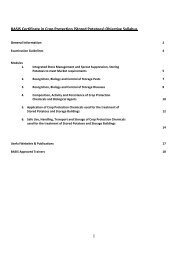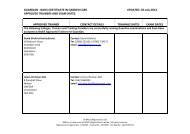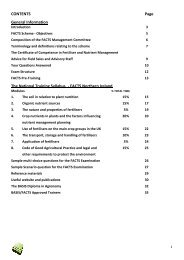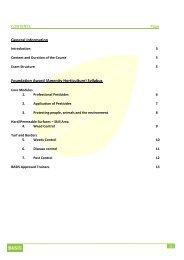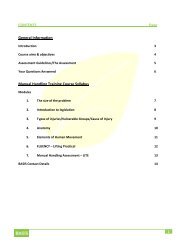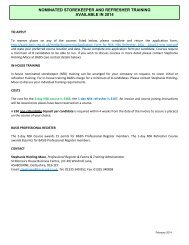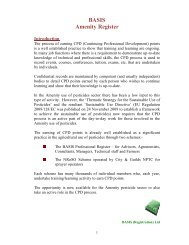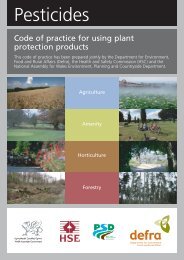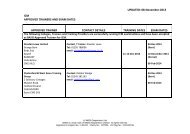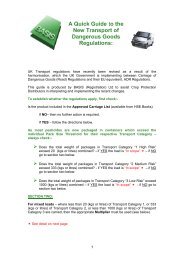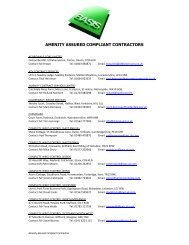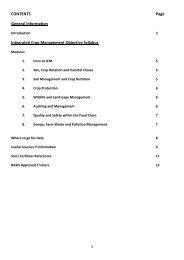BASIS Advanced Amenity Contractors Certification Scheme (BACCS )
BASIS Advanced Amenity Contractors Certification Scheme (BACCS )
BASIS Advanced Amenity Contractors Certification Scheme (BACCS )
You also want an ePaper? Increase the reach of your titles
YUMPU automatically turns print PDFs into web optimized ePapers that Google loves.
<strong>BASIS</strong> ® <strong>Advanced</strong> <strong>Amenity</strong> <strong>Contractors</strong><br />
<strong>Certification</strong> <strong>Scheme</strong><br />
(<strong>BACCS</strong> ® )<br />
A <strong>Scheme</strong> for <strong>Contractors</strong> Providing Professional Pesticide Services<br />
and Advice in the <strong>Amenity</strong>/ Industrial Sector<br />
<strong>BACCS</strong> MEMBERSHIP GUIDE<br />
Including Associate Membership for Local Authority and Corporate<br />
Company Clients.<br />
December 2010<br />
<strong>BACCS</strong>, <strong>BASIS</strong> and <strong>Amenity</strong> Assured are registered trademarks of <strong>BASIS</strong> (Registration) Limited. All rights reserved.<br />
1
Objectives 3<br />
Data Protection Act 1998 4<br />
Terms of Reference 5<br />
Entry Requirements 6<br />
<strong>Scheme</strong> Criteria 7<br />
The Audit Process 10<br />
Code of Ethics<br />
Whistle Blowing Policy<br />
12<br />
13<br />
Disciplinary Code 14<br />
Local Authority / Government Agency Associate Membership 17<br />
Corporate / Industrial Associate Membership 18<br />
Membership Fees & Charges 19<br />
Your Questions Answered 20<br />
Explanatory Notes 22<br />
2
OBJECTIVES<br />
To provide a means of recognising, through the certification scheme, suitably qualified,<br />
accredited contractors and their staff, as professionals in amenity pesticide application and<br />
related activities that would be recognised both within the Industry, by the general public<br />
and local and national government.<br />
By maintaining competence through suitable training of individuals involved in pesticide<br />
application.<br />
By ensuring professional conduct of contractors through a recognised certification scheme<br />
monitored by annual assessments and on-site verification visits.<br />
By requiring contractors to recognise and abide by the Code of Ethics and Disciplinary<br />
Systems.<br />
For clarity, the activities of the scheme will embrace all pesticides, not only those in the<br />
amenity sector but also those in the agricultural field of use, as identified in the Food &<br />
Environment Protection Act 1985 and the Control of Pesticides (Amendment) Regulations<br />
1997.<br />
To broaden the approach to the improvement, establishment and maintenance of the<br />
operating standards in the <strong>Amenity</strong> Pesticide Sector, <strong>BASIS</strong> (Registration) Ltd has combined<br />
standards and compliance criteria with NPTC and the National Association of Agricultural and<br />
<strong>Amenity</strong> <strong>Contractors</strong> (NAAC).<br />
With effect from 2007 those advanced <strong>Amenity</strong> Contractor companies who meet the audit<br />
compliance requirements set out on page 10 in this booklet and the other membership<br />
requirements of the 3 organisations, will qualify as AMENITY ASSURED contractors.<br />
The AMENITY ASSURED <strong>Scheme</strong> has been agreed and is supported by the Chemicals<br />
Regulation Directorate, the Environment Agency, the Crop Protection Association and the<br />
<strong>Amenity</strong> Forum. It has been presented to government and agreed as a positive scheme to<br />
ensure that advanced contractors are distinguished and recognised by the achievement of<br />
AMENITY ASSURED status. <strong>BACCS</strong> membership is an essential & vital part of the AMENTIY<br />
ASSURED <strong>Scheme</strong>.<br />
3
Data Protection Act 1998<br />
The provision of certain information which may be requested from time to time, or derived<br />
from reports and questionnaires, to ensure the continued success of the <strong>BACCS</strong> ® scheme,<br />
may constitute Personal Data under the Data Protection Act 1998.<br />
Where the information does so constitute Personal Data, it will be necessary for contractors<br />
and individuals to consent to its use by <strong>BASIS</strong> ® for the purposes of the <strong>BASIS</strong> <strong>Advanced</strong><br />
<strong>Amenity</strong> Contractor <strong>Certification</strong> <strong>Scheme</strong>.<br />
You will also recognise that for the furtherance and continued success of the scheme, <strong>BASIS</strong><br />
may be required to disclose any, or all, of this information to Associate members and other<br />
third parties from time to time.<br />
4
TERMS OF REFERENCE<br />
1. To establish and maintain a list of <strong>Amenity</strong> <strong>Contractors</strong> qualified to a standard<br />
appropriate for the undertaking of professional duties in <strong>Amenity</strong> Pest and Vegetation<br />
Management and related activities recognized, both within the Industry, by the<br />
general public and local and national government.<br />
2. To establish and maintain a system for the election of the Committee that recognises<br />
the wide range of persons in the Industry relevant to the <strong>BACCS</strong> <strong>Scheme</strong>; to include 3<br />
contractor representatives elected by the membership, 2 representatives nominated<br />
by the CPA <strong>Amenity</strong> Committee, 2 representatives from Client Associate membership,<br />
1 Independent Chairman, 1 representative from Corporate membership.<br />
The Committee will meet 3 or 4 times a year as required.<br />
Elections will take place every 3 years.<br />
3. The Committee will have the facility to co-opt representatives of other organisations<br />
(e.g. EA, HSE, etc.) when necessary to attend meetings where relevant topics are<br />
discussed.<br />
4. To encourage the maintenance of standards through suitable training, of individuals<br />
involved in pesticide application.<br />
5. To ensure standards of service and professional conduct are monitored regularly,<br />
through the <strong>BASIS</strong> assessment and On-Site Verification Visits.<br />
6. (1) To establish and monitor financial plans for the <strong>BACCS</strong> <strong>Scheme</strong>.<br />
(2) To establish the fee structure for the <strong>BACCS</strong> <strong>Scheme</strong> subject to approval by the<br />
Board of <strong>BASIS</strong> (Registration) Ltd, through the <strong>BASIS</strong> Logistics Committee.<br />
7. To publish the 'Pass' list, disseminate and make available information to members,<br />
Associate members and Corporate members on request.<br />
8. To establish a Code of Ethics and <strong>Scheme</strong> Criteria for members of the <strong>Scheme</strong> and<br />
maintain a means of enforcing it through a Disciplinary Committee or such other<br />
means as the Committee shall consider suitable for either general or specific cases.<br />
9. To discipline and, if necessary, remove any member from the <strong>Scheme</strong> for a breach of<br />
the Code of Ethics or <strong>Scheme</strong> Criteria in accordance with the Disciplinary Procedure.<br />
10. To report to the Board of <strong>BASIS</strong> (Registration) Limited on its activities, through the<br />
Logistics Committee, and seek the Board’s agreement to any changes in policy,<br />
through its Chairman who is a member of that Board.<br />
11. The Committee will elect a minutes secretary from members present at the meetings.<br />
5
Entry Qualifications – Full Members<br />
The scheme is open to all qualified individuals (who work independently) or qualifying<br />
companies who provide a contract application service.<br />
Individuals/ companies will be accepted for membership of the scheme subject to complying<br />
with the following conditions.<br />
1. All potential full members will be required to complete an application for membership<br />
indicating their qualifications and details of involvement within the industry.<br />
2. All potential company members must be registered with the <strong>BASIS</strong> (Registration)<br />
<strong>Scheme</strong>.<br />
3. The <strong>BASIS</strong> Certificate in Crop Protection (<strong>Amenity</strong> Horticulture), and the <strong>BASIS</strong><br />
Certificate in Crop Protection (Agriculture) are both recognised qualifications for<br />
selling (to the end user in the form of the product itself, or as a service) and offering<br />
advice on <strong>Amenity</strong> Crop Protection products.<br />
NPTC qualifications (PA1, PA2 etc) are recognised as qualifications for operatives<br />
applying amenity pesticides. All sprayer operatives must have an appropriate<br />
Certificate of Competence.<br />
4. Companies and individuals must have paid the <strong>BASIS</strong> registration fee and <strong>BACCS</strong><br />
membership fee. The registration year is 1 January to 31 December.<br />
5. All <strong>Contractors</strong> will be required to complete a staff audit form listing qualifications of<br />
all staff including NPTC numbers for all operatives.<br />
6. All full members of the scheme will be entitled to use the designatory letters after<br />
their name:<br />
<strong>BACCS</strong> Approved Contractor - BAC (<strong>Amenity</strong> Pesticides)<br />
Provisional Membership<br />
All individuals (who work independently) or qualifying companies who provide a contract<br />
application service become provisional members upon initial registration for the scheme.<br />
Individuals or qualifying companies remain provisional members of the scheme until they<br />
have passed their first on-site audit.<br />
This may not take place for several months.<br />
Individuals or qualifying members wishing to progress to full membership may pay for an<br />
additional and immediate on-site audit, which if successful would enable them to progress to<br />
full membership status.<br />
Following successful on-site and store audits the member will be added to the <strong>BACCS</strong><br />
membership list.<br />
6
Rationale:<br />
<strong>Scheme</strong> Criteria<br />
All members of <strong>BACCS</strong> have made some investment in order to meet the criteria for<br />
membership and therefore, to protect and ensure a return on this investment, it is essential<br />
that <strong>BACCS</strong> is seen by the industry, and especially by the client, as a guarantee of<br />
“excellence”.<br />
This will mean that all members must perform at a level which is recognised as above the<br />
industry standard. It will also mean that where individual members allow standards to fall,<br />
the impact will be to lower the credibility of <strong>BACCS</strong> as a whole.<br />
The introduction of a Disciplinary Code is therefore essential to the continued success of the<br />
scheme and the members who support it.<br />
Key Issues:<br />
There are two main areas for the assessment of standards; the first is the store / office<br />
assessment which includes the standard <strong>BASIS</strong> assessment. This is Part 1 of the <strong>BACCS</strong> audit<br />
and must be passed in order to achieve a successful conclusion with a ‘Pass Certificate’.<br />
Part 2 is the on-site verification visit, which is assessed using a points system for various<br />
categories, as given below.<br />
The score for each section must be at least 75% of the marks allocated for that section with<br />
the final score at least 80% of the total score for the on site visit.<br />
The section related to ‘Client satisfaction’ is regarded as perhaps the most important section<br />
and major faults or problems in this area will be treated as giving the most cause for<br />
concern.<br />
The key issues need to be viewed from the client’s viewpoint.<br />
Two main considerations must be Public Safety and Quality Performance.<br />
• Public Safety<br />
I. To ensure compliance with relevant legislation, such as FEPA, COPR<br />
(as amended), Health & Safety at Work Act (and any relevant<br />
regulations there under), Road Traffic Act, Code of Practice for<br />
Suppliers of Pesticides to Agriculture Horticulture & Forestry (Yellow<br />
Code), Code of Practice for using Plant Protection Products.<br />
II. To ensure that all sprayer operators possess appropriate certificates<br />
of competence, e.g. NPTC certificates.<br />
III. To ensure that equipment used is designed to minimise<br />
contamination of the operator, general public, wildlife, water and<br />
the environment.<br />
7
IV. To ensure the use of approved products which are least harmful to<br />
humans, water, and the environment, in relation to the efficacy<br />
required e.g. COSHH assessments, Site Specific Risk Assessment,<br />
Environmental Information Sheets etc.<br />
• Quality Performance<br />
I. To use only sprayer operators who are fully trained and possess<br />
recognised certificates of competence (NPTC etc).<br />
II. To ensure full compliance with the minimum performance standards<br />
as detailed by the contract (and the Codes of Practice)<br />
Quality Assurance Achieved By Continual Assessment of Standards:<br />
Regular monitoring of the standards of service provided by the members will be carried out<br />
through the <strong>BASIS</strong> Assessments and On-Site Verification Visits. However a key indicator will<br />
be customer comments (or complaints). The aim is to concentrate on practical issues,<br />
which may affect the operational standards of completing a contract, to full customer<br />
satisfaction within the legal guidelines already in place within the Codes of Practice.<br />
Members must ensure that operators and supervisors are trained in calibration techniques for<br />
the equipment which they are required to use.<br />
All operators should regularly conduct calibration checks to ensure that approved rates are not<br />
being exceeded.<br />
A record of all calibration checks should be maintained by operators and kept available for<br />
inspection by the <strong>BASIS</strong> Assessor and client officers.<br />
Operators should keep with them at all times, their NPTC certification reference number, and<br />
date of issue for production upon demand by the <strong>BASIS</strong> Assessor, client officers or members<br />
of the general public.<br />
Members support vehicles should carry a register of all complaints received, detailing source,<br />
name and address of complainant, location, date and time and the nature of the incident /<br />
allegation.<br />
When using quad-bikes, operators must at all times comply with the requirements of current<br />
road traffic regulations.<br />
Attention will be given to:<br />
<br />
<br />
<br />
<br />
Public Safety<br />
Environmental Safety (especially water contamination)<br />
Operator Safety<br />
Correct Application / Calibration<br />
8
The following criteria are incorporated to address these areas to which points have been<br />
allocated within the assessment as follows:<br />
Operator Information (& supervision if non-certificated) 35 points<br />
Instructions to Operators 25 points<br />
PPE available or worn when operator seen (perhaps working?) 30 points<br />
Equipment required on applicator or support vehicle 25 points<br />
Operating Unit 15 points<br />
Calibration 20 points<br />
Client satisfaction – feedback 50 points<br />
Total points for assessment 200 points<br />
The section on Client Satisfaction will be assessed according to a set of questions upon which<br />
the Client Officer (or equivalent) will be invited to comment, once the work has been<br />
completed.<br />
Any other comments made during the interview, whether positive or negative, will be recorded<br />
and kept with the reports to complete the evaluation.<br />
Associate Members of the scheme will be given access to these reports as detailed in the<br />
scheme booklet.<br />
The value of <strong>BACCS</strong> certification is increasing and it is becoming a key selection issue when<br />
tenders for work are submitted and contracts are awarded. One of the objectives of the<br />
<strong>BACCS</strong> <strong>Scheme</strong> is for the certificate awarded to each compliant company to be meaningful and<br />
to earn preferential commercial positions for that company. It is therefore vital that the <strong>BACCS</strong><br />
standards are achieved and maintained by all <strong>BACCS</strong> registered contractors.<br />
This is also the case if work is sub-contracted out. It is recognised that sometimes work has to<br />
be sub-contracted to another contractor and in these cases the following rules apply:<br />
1. Prior to using a non-<strong>BACCS</strong> registered contractor, a <strong>BACCS</strong> member must :-<br />
a) Inform Lindsay Smith at the <strong>BASIS</strong> office (01335 340851) of the intent to use a subcontractor,<br />
when and where they will be operating. Then either:<br />
b) Ensure the sub-contractor registers to be a <strong>BACCS</strong> member with immediate effect (pays<br />
the appropriate fee and is subject to audit as soon as possible).<br />
OR<br />
c) the existing <strong>BACCS</strong> member (referred to herein as the ‘Parent’) will guarantee the<br />
standard of ware of his sub-contractor(s) by:-<br />
(i)<br />
(ii)<br />
(iii)<br />
Registering an audit form per sub contractor and completing it then returning it to<br />
Lindsay Smith at the <strong>BASIS</strong> office within 1 month.<br />
Sending a letter to <strong>BASIS</strong> (as above) from the Managing Director of the parent<br />
company to personally verify that a thorough audit has been completed for each<br />
sub-contractor and that they are fully compliant with the <strong>BACCS</strong> standards.<br />
Send the appropriate subcontractor enrolment fee per sub-contractor, to the <strong>BASIS</strong><br />
office within 1 month.<br />
9
The normal <strong>BACCS</strong> audit process will operate at random, as usual, and may well independently<br />
audit a sub-contractor as part of the normal “parent” audit process.<br />
If a <strong>BACCS</strong> member is found from market intelligence or client information or random audit to<br />
be using non-enrolled sub-contractors, the member will be suspended with immediate effect.<br />
If the proper procedure is not put in place in the following 14 days then the clients of the<br />
“parent” contractor will be informed that the work being carried out for them, may not be of<br />
<strong>BACCS</strong> standard.<br />
If after 28 days the “parent” has not corrected the situation and put the proper enrolment in<br />
place then the “parent” member will be disconnected from <strong>BACCS</strong> accreditation.<br />
The Audit Process<br />
The audit for <strong>BACCS</strong> accreditation is in 3 parts:<br />
On site audit<br />
Independent random visits are made to <strong>BACCS</strong> registered contractors for audit purposes,<br />
usually between March and October each year. The visits are particularly to assess on-site,<br />
practical operations whilst contract work is being undertaken.<br />
Audit assessments are made to a standard format with any non-compliance issues being<br />
recorded under 3 broad headings:<br />
-Major non-compliance- of a legal or important safety nature- correction required<br />
immediately.<br />
-Other major non-compliance- correction required<br />
-minor non-compliance<br />
All companies will receive a report of their own on-site audit with recommendations for<br />
actions required to meet compliance standards.<br />
Companies that meet on-site compliance standards will achieve interim <strong>BACCS</strong> accreditation.<br />
Client Audit<br />
During the season, each client of <strong>BACCS</strong> members will be part of the audit process.<br />
Independent random contact will be made with member clients to determine the level of<br />
satisfaction with work that has been conducted that year by the <strong>BACCS</strong> member (or enrolled<br />
sub-contractor) any areas of problems, call backs, public issues or complaints are noted as is<br />
the corrective action taken by the member, if indeed any is required.<br />
Inspection Audit<br />
To ensure that the appropriate records, storage, vehicles, staff training, COSHH and other<br />
safety requirements are in place, each contractor member will also be visited by a <strong>BASIS</strong><br />
Store Inspection <strong>Scheme</strong> Assessor. The establishment of correct procedures and safety<br />
regimes is also a key part of the audit process, and so is part of the compliance assessment.<br />
10
Overall Compliance<br />
When a contractor member has achieved on-site client and inspection compliance then they<br />
will be a fully recognised and accredited <strong>BACCS</strong> members for the year.<br />
Since 2007 the audit process has been broader than previously to incorporate NPTC criteria<br />
and the code of conduct for the NAAC. Therefore full compliance with all criteria met, will<br />
mean that the contractor is an accredited <strong>BACCS</strong> member and a qualified member if the<br />
AMENITY ASSURED <strong>Scheme</strong> which is explained at the front of this membership guide.<br />
11
Code of Ethics<br />
This Code, to which all members of <strong>BACCS</strong> prescribe, is designed to set the standards of<br />
professional conduct for contractors and advisers who are registered with the scheme. The<br />
Code concerns the use and advice of amenity pesticide products, including Pesticides 1<br />
formulated for professional use, as identified under the Food and Environment Protection Act<br />
1985 (FEPA) and the Control of Pesticides (Amendment) Regulations 1997.<br />
No Code of Ethics can provide for all eventualities; all members of the scheme should order<br />
their affairs such that they always uphold the dignity of the <strong>Amenity</strong>/Industrial Pesticide<br />
Industry. The rules set out below are designed to assist members in the achievement of<br />
appropriate professional conduct:<br />
1. At all times a member must ensure that the advice given, and any sales of product or<br />
contracting service resulting from it, is in accordance with current legislation and, in<br />
particular:<br />
a) Has due regard to any environmental impact;<br />
b) Gives priority to the health and safety of those that purchase/use the products<br />
and supply the services concerned, and the general public.<br />
2. Members shall respect the confidentiality of information relating to a customer/<br />
client/employer.<br />
3. Members shall maintain awareness of progress and knowledge in their roles as pesticide<br />
practitioners in order to maintain a high standard of professional competence relative to<br />
their sphere of activity in line with the <strong>BACCS</strong> scheme.<br />
4. Members shall publicise their professional service with dignity and not create an invidious<br />
distinction between other members nor bring the profession into disrepute.<br />
5. Members shall co-operate with professional colleagues so that customers/clients, the<br />
public and the environment may benefit.<br />
6. A member should carry out his/her professional work with a proper regard for the<br />
technical and professional standards expected of him/her. A member should not<br />
undertake professional work that he/she is not competent to perform.<br />
7. Members should be directly responsible for all contracts undertaken and any subcontracting<br />
of pesticide application work should be only to a registered <strong>BACCS</strong> contractor.<br />
8. Members should note that failure to comply with the Code may lead to disciplinary action,<br />
including suspension or removal from the <strong>Scheme</strong>, in accordance with the Disciplinary<br />
Code of the <strong>Scheme</strong>.<br />
1 “Pesticide” means any substance, preparation or organism prepared or used for controlling any pests, unwanted<br />
vegetation and plant disease (as defined in FEPA s16(15)).<br />
12
Whistle Blowing Policy<br />
<strong>BASIS</strong> (Registration) Ltd is committed to the highest standards of openness and<br />
accountability. Therefore, we expect employees, candidates and others who work with <strong>BASIS</strong><br />
who have serious concerns about any aspect of our work to voice those concerns.<br />
To this effect <strong>BASIS</strong> has a Whistle Blowing Policy for <strong>BASIS</strong> Approved Trainers, Examiners<br />
and Candidates. This procedure is designed to allow concerns of a public interest kind within<br />
<strong>BASIS</strong> to be raised, investigated and where appropriate, acted upon. Complaints may be<br />
made by any member of staff, candidate or those contracted to provide services to <strong>BASIS</strong>.<br />
The full Whistle Blowing Policy can be found here;<br />
To view the full Whistle Blowing Policy go to;<br />
http://www.basis-reg.co.uk/media/documents/430/index.html<br />
13
<strong>BACCS</strong> : Disciplinary Code<br />
Objective:<br />
The key objective of introducing a Disciplinary Code is to ensure that the high standards set<br />
by the criteria for membership of the scheme are maintained. The aim is to encourage<br />
continuous attention to safe and accurate application and safe and appropriate working<br />
practices.<br />
Disciplinary Action:<br />
This is divided into three sections:<br />
Assessment Faults<br />
1. Faults in Part 1, the office / store assessment, including the standard <strong>BASIS</strong> assessment.<br />
2. These faults will be itemised in a report and if corrected within a reasonable time, should<br />
not prevent the issue of either the <strong>BASIS</strong> certificate or the <strong>BACCS</strong> ‘Pass Certificate’.<br />
3. Serious faults will however result in a ‘Fail’ for the store and consequently for the <strong>BACCS</strong><br />
assessment as a whole.<br />
4. Faults in Part 2, the On-site Verification Visit will be assessed according to the points<br />
system described under ‘<strong>Scheme</strong> Criteria’ and if they fall below the pass criteria as<br />
described, will result in a ‘Fail’ for the assessment as a whole.<br />
5. Any member failing the assessment would have a temporary suspension of membership<br />
until proven remedial action had been taken.<br />
6. Failure to correct the weakness / shortfall within a specified period would result in a<br />
failure for that season, and suspension from the <strong>BACCS</strong> ‘Pass List’.<br />
7. Where the failure is due to a low score in Part 2, the member may elect to undertake a<br />
second on-site verification visit, at his own expense.<br />
8. Where the second on-site visit is successful, the member will receive a ‘Pass’ certificate,<br />
though both on-site reports will be kept on file.<br />
9. If the second on-site visit is not successful, the member will not receive a ‘Pass’<br />
certificate, nor appear on the ‘<strong>BACCS</strong> Pass List’.<br />
10. A ‘Pass’ certificate will be issued in January of each year, related to a successful outcome<br />
of the previous years’ assessment, (i.e. 2011 ‘Pass’ certificate relates to assessments in<br />
2010).<br />
11. Although in order to pass the <strong>BACCS</strong> assessment, a contractor must achieve a ‘Pass’ in<br />
the standard <strong>BASIS</strong> assessment, it is not necessary to pass <strong>BACCS</strong> to achieve a pass in<br />
the <strong>BASIS</strong> assessment.<br />
14
Client Satisfaction / Complaints<br />
1. Comments received from clients, and the results of the client questionnaires, will be<br />
taken very seriously in any disciplinary procedures against a contractor.<br />
2. The Disciplinary Committee may solicit comments and evidence of the contractor’s<br />
performance from clients other than the complainant, or the client concerned with the<br />
on- site visit, for that season’s assessment.<br />
3. Complaints received from clients which are unrelated to an on-site visit, will also be<br />
investigated and may lead to disciplinary procedures against the contractor concerned.<br />
Breaches of the Code of Ethics<br />
1. Allegations, of a breach of the Code of Ethics, will be investigated by the <strong>BACCS</strong><br />
Chairman and or <strong>BASIS</strong> Managing Director<br />
2. Should the <strong>BACCS</strong> Chairman or <strong>BASIS</strong> Managing Director decide that there is no case to<br />
answer, no further action will be taken with the member.<br />
3. In the event that the <strong>BACCS</strong> Chairman or <strong>BASIS</strong> Managing Director believes that there<br />
has been a prima facie breach of the Code it will be reported to the Disciplinary<br />
Committee (DC).<br />
NB - No action will be taken regarding any allegation unless the complaint is<br />
substantiated or confirmed in writing.<br />
The DC is a sub-Committee of the <strong>BACCS</strong> Steering Committee and is made up of:<br />
a) The <strong>BACCS</strong> Committee Chairman<br />
b) Two other members of the Steering Committee, one of whom must be<br />
engaged in the same discipline as the member under investigation, and one<br />
Associate member<br />
c) One member of the <strong>BASIS</strong> Logistics Committee.<br />
d) <strong>BASIS</strong> nominated employee who will act as Secretary to the DC.<br />
The DC shall consider the allegation made against the member. If it considers that there is<br />
no case to answer (or the matter is so trivial) it may dismiss the case without further<br />
reference to the member. No record of such a case will be retained, but the DC has the<br />
power to comment on the case to the complainant.<br />
In all other cases the DC will advise the member of the complaint made and will seek the<br />
member’s views on it. If, after considering the member’s views, the DC is of the opinion<br />
that there is no case to answer, no further action will be taken.<br />
In the event that the DC is of the opinion that there is a case to answer, then the member<br />
shall be so advised by the <strong>BACCS</strong> Chairman / <strong>BASIS</strong> Managing Director and at the same time<br />
15
the member will be advised of:<br />
a) The date on which the DC will meet to consider the case (such date to be<br />
agreed with the member where possible);<br />
b) The member’s right to be present at the hearing and to nominate a<br />
representative;<br />
c) His/her right to call witnesses;<br />
d) His/her right to present further written information before the hearing;<br />
Any information / evidence which will be used at the hearing should be<br />
submitted to the <strong>BASIS</strong> Logistics Manager at least 14 days prior to the<br />
hearing.<br />
e) Copies of correspondence can be made available to the member, on request.<br />
Should the member fail to acknowledge the <strong>BACCS</strong> Chairman / <strong>BASIS</strong> Managing Directors’<br />
advice, of the DC hearing, within 21 days, then the DC may proceed with the case, without<br />
further reference to the member, and may take such action as it considers appropriate to the<br />
case.<br />
At the DC hearing the member may present his/her case, or have it presented for him/her,<br />
and may call witnesses but may not cross examine his/her own witnesses.<br />
The DC shall have the right to impose any of the following penalties:<br />
a) Warn member as to future conduct;<br />
b) Issue a strong reprimand;<br />
c) Suspend the member for a period; - during which the member will be<br />
excluded from the ‘Quality Assured Standard’ list.<br />
d) Defer expulsion of the member for a (specific) number of years, during<br />
which time the member will be suspended and will be required to fund<br />
additional on-site assessments and demonstrate full compliance with the<br />
regulations and the terms of the scheme. The member will be excluded<br />
from the ‘Quality Assured Standard’ list.<br />
e) Recommend to the <strong>BACCS</strong> Committee that the member be expelled from the<br />
<strong>Scheme</strong>.<br />
f) Breaches of primary legislation will be reported to the relevant authorities.<br />
After the hearing the DC shall consider the case in the absence of any third parties and will<br />
deliver its conclusion and penalty if any. The conclusion and penalty shall be confirmed in<br />
writing to the member, the <strong>BASIS</strong> Registration Board, the Chairman of the Logistics<br />
Committee and the <strong>BACCS</strong> Steering Committee.<br />
The member may appeal against the decision taken by the Committee, in writing, within<br />
fourteen days of notification of the decision. In the event of an appeal, an independent<br />
arbiter, agreeable to both the Committee and member, shall be appointed. The arbiter may<br />
need to appoint assessors if it is a very difficult technical case, especially if a company’s<br />
product is involved.<br />
The <strong>BACCS</strong> Chairman / <strong>BASIS</strong> Managing Director shall make an estimate of the costs of the<br />
Appeal and shall inform the member. The member will be required to lodge the estimated<br />
costs with the <strong>BACCS</strong> Chairman /<strong>BASIS</strong> Managing Director prior to the Appeal. Should the<br />
Appeal be successful, the costs will be returned to the member and all other costs will be<br />
borne by the <strong>Scheme</strong>.<br />
16
The arbiter’s decision shall be final and binding.<br />
Local Authority / Government Agency Associate Membership<br />
Entry Qualifications<br />
Associate membership of the scheme is open to all Local Authorities and Industrial<br />
companies using contractors for pesticide application work in the amenity sector of the<br />
industry.<br />
Individual authorities and companies will be accepted for membership of the scheme subject<br />
to complying with the following conditions.<br />
Benefits<br />
1. Acceptance of <strong>BACCS</strong> as a way of raising standards of pesticide application in<br />
the <strong>Amenity</strong>/ Industrial sector.<br />
2. All potential Associate members will be required to complete an application<br />
form for membership of the scheme.<br />
3. All potential Associate members will be required to indicate the source of the<br />
advice for the pesticide application work undertaken.<br />
4. If the intention is for advice to be given by the client, Client Officers will be<br />
required to submit the names and qualification numbers of the advisors. Advice<br />
on the use of professional pesticide products may only be given by suitably<br />
qualified advisers, as required by the Control of Pesticides (Amendment)<br />
Regulations 1997. The <strong>BASIS</strong> certificate (<strong>Amenity</strong> Horticulture) is the only<br />
qualification recognised by Ministers in this area.<br />
5. Local authorities or companies must have paid the <strong>BACCS</strong> Associate<br />
membership fee. The registration year is 1 January to 31 December.<br />
1. The full list of <strong>BACCS</strong> members will be supplied each year on renewal of the<br />
Associate membership.<br />
2. The full list of contractors achieving a current ‘Pass’ certificate will be supplied<br />
each year to Associate members.<br />
3. Associate members will have access to the <strong>Scheme</strong> Complaints Procedure.<br />
4. Associate members will be able to request an independent assessment of non-<br />
<strong>BACCS</strong> contractors upon payment of the appropriate fee.<br />
5. Associate members may request up to 3 contractor assessment reports per<br />
annum.<br />
6. Associate members may request additional contractor assessment reports upon<br />
payment of the appropriate fee.<br />
7. Associate members will be entitled to representation on the <strong>BACCS</strong> Steering<br />
Committee.<br />
17
Corporate / Industrial Associate Membership<br />
Entry Qualifications<br />
Corporate / Industrial membership of the scheme is open to all manufacturers and large<br />
corporate users of pesticides and pesticide contract services.<br />
<strong>Scheme</strong> Requirements and Benefits<br />
1. The full list of <strong>BACCS</strong> members will be available on request each year on<br />
renewal of the Corporate / Industrial Associate membership.<br />
2. All potential Corporate / Industrial Associate members will be required to<br />
complete an application form for membership of the scheme.<br />
3. All potential Corporate / Industrial Associate members will be required to<br />
indicate the source of the advice for the pesticide application work undertaken.<br />
4. If the intention is for advice to be given by the client, Client Officers will be<br />
required to submit the names and qualification numbers of the advisors. Advice<br />
on the use of professional pesticide products may only be given by suitably<br />
qualified advisers, as required by the Control of Pesticides (Amendment)<br />
Regulations 1997. The <strong>BASIS</strong> certificate (<strong>Amenity</strong> Horticulture) is the only<br />
qualification recognised by Ministers in this area. Advisers will be expected to<br />
undertake Continuing Professional Development (CPD)<br />
5. Corporate / Industrial Associate members may request copies of contractor<br />
assessment reports at no extra cost.<br />
6. Corporate / Industrial Associate members will receive a copy of the annual<br />
<strong>BACCS</strong> <strong>Scheme</strong> Summary, which will acknowledge the support of Corporate<br />
Members by inclusion of a ‘Corporate Sponsors’ List.<br />
18
Membership Fees & Charges<br />
(ex-vat)<br />
1. <strong>BASIS</strong> Registration Fee – Contractor with Store £ available on request<br />
2. <strong>BASIS</strong> Registration Fee – Contractor (No Store) £ available on request<br />
3. Contract Charge<br />
Band 1= Up to £10,000 £144.00<br />
Band 2= £10,001 - £30,000 £360.00<br />
Band 3= £30,001 - £80,000 £694.00<br />
Band 4= £80,001 upwards £1050.00<br />
4. 2 nd On-Site Visit (when requested) £650.00<br />
5. Local Authority / Govt. Agency Associate Membership £286.00<br />
6. Corporate / Industrial Associate Membership £648.00<br />
7. Independent Assessment Fee £650.00<br />
8. Provisional Membership (additional on-site audit fee) £650.00<br />
9. Additional Reports -<br />
Store & On-Site Verification Visit £100.00<br />
On-Site Verification Report Only £60.00<br />
10. Sub Contractor Registration Fee – per contractor £150.00<br />
19
Why should you choose a Contractor who is part of this scheme?<br />
1. Value for Money:-<br />
<strong>Contractors</strong> joining the scheme will have to achieve certain criteria (assessed by<br />
<strong>BASIS</strong>) before they are fully approved, giving protection to the client and also ‘Best<br />
Value’, Value for Money contracts.<br />
2. Guaranteed Results :-<br />
The scheme includes D.S.O.’s and D.L.O.’s as well as Private contractors so it is open<br />
for anyone to work to the standard. This leads to a wide choice in selecting quality<br />
weed control contractors.<br />
3. Peace of Mind:-<br />
Acts as an extension of the existing and already well respected <strong>BASIS</strong> Annual Store<br />
Inspection <strong>Scheme</strong>. This leads to peace of mind that the job will be done correctly,<br />
as you will be using the spraying ‘elite’.<br />
4. Recognised <strong>Scheme</strong>:-<br />
It is fully endorsed by <strong>BASIS</strong> and the CROP PROTECTION ASSOCIATION, with<br />
backing from The Chemicals Regulation Directorate, Environment Agency,<br />
The Health and Safety Executive, The Scottish Environment Protection<br />
Agency, NAAC and NPTC.<br />
5. Less Hassle for You:-<br />
It leads to a reduction in the burden of administrative paperwork incurred by<br />
the Local Authority Tender issuer, as <strong>Contractors</strong> will already have achieved a known<br />
set of criteria, which are regularly reviewed.<br />
6. <strong>Scheme</strong> ‘Wanted’ by Local Authorities:-<br />
Most Local Authorities sent questionnaires about the scheme were prepared to issue<br />
tenders to <strong>Contractors</strong> holding this “accreditation”.<br />
What Will Be Covered By The <strong>BACCS</strong> <strong>Scheme</strong>?<br />
Health and Safety issues.<br />
COSHH assessment and its communication.<br />
Training and record keeping.<br />
Quality Assurance.<br />
Environmental Awareness.<br />
Site visits by highly trained and experienced <strong>BASIS</strong> trained staff to ensure<br />
contractors are adhering to a recognised high standard and are spraying the<br />
specified chemicals in the right manner, safely and with the right equipment.<br />
Liaison and reports from the clients with satisfaction clarification to ensure<br />
quality of work is kept up.<br />
A Steering Committee will meet to review members and criteria of the scheme<br />
three or four times a year.<br />
THE SCHEME PROVIDES A STANDARD COMPARABLE TO, FOR EXAMPLE, “CORGI”<br />
FOR GAS FITTERS. THE RECOGNISED STANDARDS IN THIS INDUSTRY BEING<br />
“<strong>BACCS</strong>” FOR AMENITY SPRAY CONTRACTORS.<br />
20
<strong>BACCS</strong> provides:<br />
THE <strong>BASIS</strong> ADVANCED CONTRACTORS<br />
CERTIFICATION SCHEME<br />
A rigorous annual assessment for amenity contractors, working in<br />
local authority, industrial, utility and other environmentally sensitive<br />
areas.<br />
<strong>BACCS</strong> is a recognised independent scheme with backing<br />
from:<br />
• AIC<br />
• <strong>Amenity</strong> Forum<br />
• CPA<br />
• CFOA<br />
• CRD<br />
• EA<br />
• HSE<br />
• LOCAL AUTHORITY ENVIRONMENTAL HEALTH OFFICER<br />
• NAAC<br />
• City & Guilds NPTC<br />
• SEPA<br />
21
Explanatory Notes – On-Site Verification Report<br />
In order to ensure the relevance of the on-site verification procedure, the visit is<br />
unscheduled and no prior notice is provided to the contractor.<br />
The following notes are intended to provide useful information:<br />
OPERATOR INFORMATION:<br />
All operators should have with them at all times, their NPTC certification which should be<br />
applicable to the equipment being used.<br />
Operators that are not certificated must be working at all times, within sight and sound of<br />
qualified operators.<br />
It is advisable (and professional) for all operators to be in possession of company ID.<br />
INSTRUCTIONS IN WRITING:<br />
To avoid confusion, all instructions must be confirmed in writing, detailing all relevant<br />
information, which should include for example:-<br />
• Dimensions (lengths and areas).<br />
• Objectives - kerbs and channels only or full footpaths. In addition, whether tree bases<br />
and street furniture are included or specifically excluded.<br />
• Any specific client requirements – dates / timings etc.<br />
• Site Specific Risk Assessment<br />
This information may be carried on the support vehicle but must be kept available for<br />
inspection by the <strong>BASIS</strong> Assessor and Client officers.<br />
SITE CONTACTS:<br />
Operators should be supplied with the relevant contact details (Name, telephone numbers)<br />
for the appropriate member of the clients’ organisation, who they can contact when queries<br />
arise.<br />
PRODUCTS TO BE USED:<br />
The precise product name(s) and approval number(s) must be provided in writing, together<br />
with the dose rate(s) to be applied.<br />
It is strongly recommended that all pesticide applications result from written<br />
recommendation supplied by a <strong>BASIS</strong> qualified advisor.<br />
APPLICATION RATE / EQUIPMENT CALIBRATION:<br />
22
This must be specific and should show the proposed application rate along with the<br />
appropriate calibration criteria. In addition, operators will be required to demonstrate that<br />
their equipment has been checked to ensure that the correct application rate is being<br />
maintained and that the date and time of all calibration checks have been recorded.<br />
Operators will also be required to produce a current calibration sheet for the work in<br />
progress.<br />
It is strongly recommended that all spray application equipment (except Knapsacks) is NSTS<br />
tested annually.<br />
ESSENTIAL INFORMATION:<br />
For each product being used or transported on the vehicle, the following are required:-<br />
A full and readable label (in English) on every container, including a current UK approval<br />
number.<br />
COSHH sheets.<br />
Material Safety Data Sheets (MSDS).<br />
If appropriate ‘Instructions in Writing’ if the load exceeds the threshold for ADR regulations.<br />
Site specific Risk Assessment for the work to be completed.<br />
Method Statement for the work to be carried out.<br />
In addition, operators need to be aware of the requirements of the ‘statutory’ Code of<br />
Practice (For Using plant protection products) and provision should be made for them to gain<br />
access to either a copy of the Code and to other relevant information.<br />
DAILY CHEMICAL USAGE:<br />
This information is now a statutory requirement and must be recorded on an on-going basis<br />
and in a readily available format which can be produced for inspection by the <strong>BASIS</strong> Assessor<br />
and Client officers.<br />
PPE / SAFETY EQUIPMENT:<br />
Essential items are:-<br />
<br />
<br />
<br />
<br />
<br />
<br />
<br />
<br />
<br />
<br />
Coverall<br />
Nitrile gloves<br />
Wellingtons<br />
Hi-visibility vest (for highway use).<br />
Face-shield<br />
Half-face respirator and dust mask (A1/P3 or ABEK/P3 combinations only).<br />
500 ml eye irrigators (current and in date)<br />
First aid kit.<br />
Fire extinguisher (checked annually and marked with due-date of next inspection).<br />
Full Spill Kit for Pesticide spillages.<br />
23
SUPPORT VEHICLES:<br />
Stock sheet detailing name and quantities of pesticides transported.<br />
The provision of an appropriately bunded storage facility for the retention of all concentrate<br />
transported.<br />
Facility for storing triple rinsed empty containers and full details of the disposal method used.<br />
Clean washing water together with a quantity of clean (drinking) water.<br />
Please note that a full list of the audit requirements is available from the <strong>BASIS</strong> office.<br />
24



